- Home
- Andrzej Sapkowski
Baptism of Fire Page 7
Baptism of Fire Read online
Page 7
“They were here for that.” He pointed to the pine coffin lying in the cart, the wood had been darkened by the rain. It was already raining less now and the thunder had stopped. The storm was moving towards the North. The witcher picked up his sword which was lying among the leaves, and jumped onto the cart, cursing softly at his knee, still reminiscent of the pain.
“Help me open it.”
“What are you doing, the dead want to rest...” Milva broke off, seeing the holes drilled in the cover. “Damn! The hawker was carrying a live one in that box?”
“It's a prisoner,” Geralt levered the lid. “The merchant was waiting for the Nilfgaardians here to give it to them. I heard them exchange a signal and password ...”
The cover tore off with a bang, revealing a man gagged, leather loops attached to the sides of the coffin for his arms and legs. The witcher bent. He looked closely. And once again, more carefully. He swore.
“Hold on,” he said slowly. “Now, that's a surprise. Who would have thought?”
“You know him, witcher?”
In answer to her question, Geralt smiled nastily in full view of the prisoner. “Put the knife away, Milva. Do not cut his shackles. This is an internal affair of Nilfgaard. We should not interfere.
We will leave him as he is.”
“Did I hear right?” Dandelion said behind them. He was still pale, but curiosity had already overcome his other emotions.
“You want to leave a man bound in chains in the forest? My guess is that you have recognized someone with whom you have a bone to pick, but they are still a prisoner, hell! They were a prisoner of the people who attacked and almost killed us. The enemy of our enemies ...”
He paused, seeing the witcher pull a knife from his boot. Milva cleared her throat softly. The dark blue eyes of the prisoner, narrowed from the constant dripping of rain drops, now widened. Geralt leaned over and cut the loop binding his left arm.
“Look, Dandelion,” he said, grabbing the wrist and raising the released hand. “You see this scar on his hand? Its where Ciri cut him. On the island of Thanedd, a month ago. He's a Nilfgaardian. He came to Thanedd specifically to abduct Ciri. She made this cut, to avoid being kidnapped.”
“This hand obviously hasn't served him very well in defense,” Milva muttered. “Still, something here does not make sense. If this one kidnapped Ciri on behalf of Nilfgaard, why has he fallen into that coffin? Why did the hawker want to sell him to Nilfgaardians? Remove the gag from his mouth, witcher. Maybe he will tell us something?”
“I do not want to listen to him,” he said in a hoarse voice. “My hand itches, when I see him lying there, looking at me. I can hardly hold back. If he starts talking, I will not be able to restrain myself. I haven't told you everything about him.”
“In this case, do what you like,” Milva shrugged. “Hit him, if he's such a bastard. But quickly, because time is pressing. As I said, the Nilfgaardians are not far away. I'll get my horse.”
Geralt straightened up, releasing the prisoner's hand.
He immediately tore from his mouth and spat out the gag, but did not speak. The witcher tossed the knife onto his chest.
“I do not know for what sins they put you in this box, Nilfgaardian,” he said. “I do not care. I leave you this knife, liberation itself. Wait here for your friends or get lost in the woods, whatever.”
The prisoner was silent. Hands and feet bound, lying at the bottom of a wooden box, he looked even more wretched and vulnerable than he had on Thanedd, where Geralt had seen him on his knees, wounded, trembling with fear in a pool of blood. He looked much younger too. The witcher did not give him more than twenty-five years.
“I spared you on the island,” he added. “And I will spare you now. But it's the last time. The next time we meet, I'll kill you like a dog. Remember that. If you want to persuade your comrades to chase after us, take the coffin with you. You will need it. Come on, Dandelion.”
“Come on, quickly!” Milva cried, returning to the path leading West in a gallop. “But not that way! The forest! Son-of-a-bitch! Into the forest!”
“What happened?”
“An army comes from the Ribbon! It's Nilfgaard! What are you looking at? Get on your horses, before they overtake us!”
The battle in the village had already lasted an hour and still there were no indications that the end was nearing. The foot soldiers that defended from behind stone walls, fences and carts arranged in a barricade, had now repelled three cavalry attacks which had charged at them from the dike. The width of the dike would not let the horses gather frontal momentum and allowed the soldiers to focus their defense. As a result, each wave of cavalry fell apart at every attempt against the barricades from which desperate but stubborn footmen shot at the troops of horsemen with a shower of darts and arrows. The cavalry fired up and swirled, and the defenders fell on them in a quick counterattack, killing all who were left with axes, spears and flails. The cavalry retreated over the dike, leaving the corpses of men and horses, and the soldiers hid behind the barricades throwing the enemy filthy insults. After some time, the cavalry formed up and attacked again. And so on.
“I wonder who fights with whom?” Dandelion asked, though it was hard to understand him. Milva had given him some stale bread and he was trying to soften it in his mouth.
They sat on the edge of a cliff, well hidden among juniper bushes. They could observe the battle without fear of being seen. Or rather, the only thing they could do was watch. They had no other choice. Before them the battle raged, and the forest behind them was on fire.
“It is not difficult to guess,” Geralt finally, but unwillingly decided to answer Dandelion's question. “The men on horseback are Nilfgaardians.”
“And the foot soldiers?”
“They are not Nilfgaardian.”
“The mounted soldiers are the volunteer cavalry of Verden,” Milva said, who had been suspiciously tight-lipped and grim. “They are the ones in the checkered jackets, and those in the village are the soldiers of Brugge. I know their banner.”
Indeed, rejuvenated by their new success, the infantry had hoisted a green flag on the ramparts with a cross embedded in white. Until then, Geralt had not seen any standard, but as he had carefully observed, the defenders had just hoisted one. Apparently they had lost at the beginning of the battle.
“How long will we sit here?” Dandelion asked.
“There you have it,” muttered Milva. “What a question. Look around! If you cannot rotate yourself, get up off your ass and look.”
Dandelion did not have to look or turn round. The entire horizon was streaked with plumes of smoke. In the North and West the smoke was the thickest, where one of the armies had set fire to the forest. The sky to the South, the direction in which they'd been heading towards when the battle had cut off the road, was also black. And in just one hour, in the time they had spent on the mountain, the smoke had also spread to the East.
“Nevertheless,” the archer took a moment, looking at Geralt, “I am curious as to what you intend to do now, witcher. Behind us Nilfgaard and burning forest, and lying ahead... well, you can see. What's your plan then?”
“My plan hasn't changed. Wait out the brawl, then I'm heading South. Over the Yaruga.”
“Perhaps you have lost your mind.” Milva frowned. “You will see what happens. You can plainly see that this is war, it is not just some playful tour of men. Nilfgaard goes straight from Verden. Going South, they will certainly have passed all of Brugge, and have probably crossed the Yaruga. Perhaps even Sodden is on fire...”
“I have to reach the Yaruga.”
“Perfect. And then?”
“I'll find a raft, and sail with the tide, I'll try to get to the estuary. Then I'll find a boat ... From there, damn it, there must be a boat...”
“To Nilfgaard?” She laughed. “So, your plans haven't changed?”
“You do not have to accompany me.”
“Of course, I'm not obliged to. To which I th
ank the gods, because I do not seek death. Me, I do not fear anything, but I must say to you: do not be so fearless that you get yourself killed.”
“I know,” he replied calmly. “I understand this. I would not travel this way if I did not have to. But I have to, so I'm going. Nothing can stop me.”
“Ha!” She measured him with her eyes. “Your voice sounds as though someone were scratching the bottom of an old pot with a knife. Had the Emperor heard you, he'd let go of his pants in fear. “To me guards! To me, the Imperial cohort! Woe is me, woe is me! A witcher comes to me in a canoe, he will be here soon, he will take my life and deprive me of my crown! I'm lost!””
“Stop it, Milva.”
“Like hell! It's time that someone told you to finally face the truth. Let me never skin a rabbit again if I have ever seen a more idiotic man! You think you are going to snatch the girl away from Emhyr? The girl that he has set his sights on? The girl that he has taken from kings? Emhyr has strong claws, which do not let go easily. Even kings are afraid of him, and you want to take something of his?”
He did not answer.
“You are about to go to Nilfgaard,” Milva repeated, nodding her head in pity. “To make war with an Emperor, and to take away his bride. Have you not thought about what might happen? When you get there, when you find this Ciri in her room at the palace, in all her gold and silks, what are you going to say? Come, love, to me, why would you stay here at the Imperial throne, when the two of us can live together in a hut and eat bark till the harvest. Look around you, you ragged cripple! Even the cloak and boots you got from the Dryads belonged to some elf before that, who died of his wounds in Brokilon. You know what will happen when you find your lady? She will spit in your face and laugh, she will order the palace to throw you out and give you as food to the dogs!”
Milva spoke louder and louder, and at the end of her speech she was almost screaming. Not only with anger, but to outshout the growing noise of the battle. From below, dozens, maybe hundreds of throats bellowed. A new attack had spilled onto the defenders of Brugge. But this time from both sides simultaneously. The cavalry of Verden, in their blue checkered robes, rode along the embankment, while a large detachment of horsemen in black coats came from behind the dike, attacking the defenders at the flank.
“Nilfgaard,” said Milva curtly.
This time the infantry of Brugge had no chance. The cavalry broke through the barrier and instantly spread the defenders with their swords. The banner of the cross fell. Some of the soldiers threw down their weapons and surrendered, and some tried to flee towards the forest. However a third division attacked from the forest, a host of light infantry riders wearing motley uniforms.
“Scoia'tael.” Milva said, getting up. “Now do you understand what is happening, witcher? Has it come to your brain yet? Nilfgaard, Verden and the Squirrels are in cahoots. This is war. As in Aedirn a month ago.”
“It is a raid,” Geralt shook his head. “A raid for loot. They are men on horseback only, not infantry, there is no ...”
“The infantry has already reached the strongholds and assemblies. Those fumes, where do you think they are from? From the salmon smokehouse?”
From the village below, came the wild, shrill cries of fugitives fleeing, and being massacred by the Squirrels. The roves of huts burst into smoke and flames. The strong wind had dried the thatched tops after the morning downpour, the fire spread rapidly.
“Oh,” muttered Milva, “the village is going up in smoke, and it's not long since it was rebuilt after the war. For two years they toiled to build foundations, and it is all destroyed in a few moments. Are you learning anything from this?”
“What can I learn?” Geralt asked sharply.
She did not answer. The smoke from the burning village rose up high, reaching the cliff. It stung their eyes, and made them weep. Screams echoed from the conflagration. Dandelion suddenly turned as pale as a sheet.
The prisoners were rounded up and surrounded by a ring of horsemen. At the command of a knight who wore a helmet with black plumes, the riders began to mow down and stab at the helpless. Those who fell were trampled by the horses. The circle was closing. The cries, which carried up to the cliff, no longer resembled the voices of humans.
“And you are certain we have to go South?” Asked the poet, looking meaningfully at the witcher. “Through these fires? Where there is such butchery?”
“I feel,” said Geralt reluctantly, “that we have no choice.”
“Well,” Milva said. “I can take you through the forests to Owl Hill and back to the Ceann Treise, towards Brokilon.”
“Through the burning forests? So we risk passing the troops, which we barely escaped before?”
“It is safer than taking the road to the South. The Ceann Treise is only fourteen miles from here, and I know the path.”
The witcher looked down at the village which had perished in the fire.
The Nilfgaardians had already dealt with the prisoners and the cavalry had gathered into a marching column. The motley crew of Scoia'tael had started moving, taking the path to the East.
“I cannot go back,” he said firmly. “But you can accompany Dandelion to Brokilon.”
“No!” the poet protested, though he still hadn't regained a normal color. “I'm going with you.”
Milva waved her hand, she picked up her bow and quiver, walked towards her horse, and suddenly turned around.
“The devil,” she snapped. “I've spent too much time trying to save the elves from certain doom. I cannot just stand and watch now as you go to your deaths! I will go with you to the Yaruga, you crazy fools, but not by the Southern track, only the route to the East.”
“The forests are already on fire there too.”
“I'll take you through the flames, I'm used to it.”
“You do not have to do that, Milva.”
“Of course, I don't have to. Well, get in the saddle! Finally, let's get moving!”
The three companions did not get far. Their horses could hardly move through the overgrown paths. They did not dare to use the roads, the sound of clattering armor and swords clashing betrayed the presence of troops all around. Twilight surprised them while they were on a trail through a ravine tangled with bushes, and they decided to stop for the night. It was not raining, and the sky was clear, aglow from the fire.
They found a relatively dry place, sat down, and wrapped themselves in cloaks and blankets. Milva went to inspect the area. As soon as she left, Dandelion proceeded to vent his curiosity, which the Brokilon archer had aroused in him.
“That girl certainly likes a bit of action,” he muttered. “You're lucky, you have a gift for meeting these kinds of women, Geralt. Slender and graceful, she walks as if she's dancing. A bit too narrow in the hips for my taste, and her shoulders are a little broad, but still feminine, ah yes feminine ... Those two apples on the front, ho, ho ... Soon her shirt will burst open...”
“Shut up, Dandelion.”
“On the road,” the dreaming poet continued, “I happened to touch her by accident. Her thighs, I tell you, they are like marble. Oh I tell you, you can't have been bored during the month you spent in Brokilon...”
Milva, who had just returned from her patrol, had heard Dandelion's theatrical whispers, and felt the stares.
“Talking about me, poet? Why do you stare at me when my back is turned? Do I have bird shit on it?”
“We cannot help but admire the skill in which you handle your bow,” Dandelion grinned. “You would not find many competitors in archery tournaments.”
“Lies, lies.”
“I've read,” Dandelion flashed a look at Geralt, “that the best archers are Zerrikanian, those of the Steppe clans. Some reportedly cut their right breast, so that they do not get in the way when tightening their arches. The bust, they say, falls into the path of the chord.”
“That is the invention of a poet!” Milva laughed. “He writes that kind of nonsense, whilst dipping his pen into the c
hamber pot, and only fools believe it. What, we shoot arrows from our tits? We must stand to the side and draw the chord to our mouth, it is as simple as that. Nothing gets in the way of the chord. These stories about cutting, they are an invention of an idle head, obsessed with the breasts of women.”
“Thank you for your full appreciation of poets and their poetry. And as for the science of archery, the bow is a good weapon. You know what? I think it is precisely in this direction they will develop the art of war. In future we will fight from a distance. Weapons will be invented so far-reaching, that the opponents will be able to kill one other without seeing eachother at all.”
“Rubbish,” Milva summed up her feelings in one word. “The bow is a good thing, but war is man against his opponent, at swords length, the strongest smashes the weakest. It has always been like that and has no reason to change. If it stops, then all wars will end. Until then, you see what war is like, in that village over the dike. Eh, what's the use of talking in vain. I'll take a walk and look around. The horses whinny like there is a wolf circling nearby...”
“A beautiful woman,” Dandelion gazed at her. “Hmmm ... Remember what she said, when we were sat atop the cliff above the village causeway... Can you not admit that she had her reasons?”
“Reasons?”
“Relative to ... Ciri,” the poet stammered a little. “Our beautiful wench that shoots faster than her own shadow does not seem to understand the relationship between you and Ciri, and it seems to me that she thinks you intend to compete with the Emperor of Nilfgaard for her hand. That is the real theme of your trip to Nilfgaard.”
“In regards to this, she is not correct, not even one little bit. So how was she right?”
“Wait, do not fret. But look at the truth. You protect Ciri and you consider yourself her guardian, but this is no ordinary girl. She is a royal child, Geralt. She is predestined for the throne, and there is no doubt about it. A palace, a crown... Maybe not that of Nilfgaard, I don't know if Emhyr would be the best of husbands...”
“No. You do not know.”

 something ends something begins sapkowski
something ends something begins sapkowski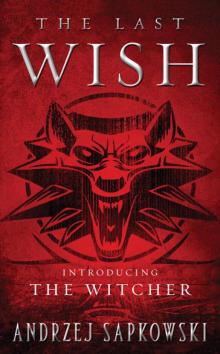 The Last Wish
The Last Wish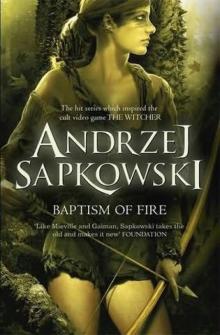 Baptism of Fire
Baptism of Fire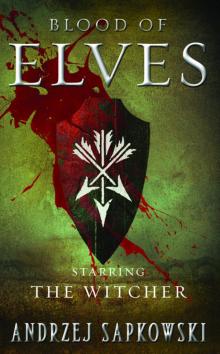 Blood of Elves
Blood of Elves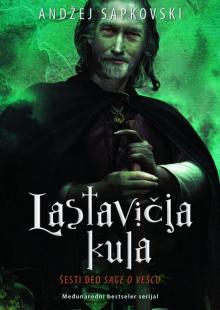 Lastavičja Kula
Lastavičja Kula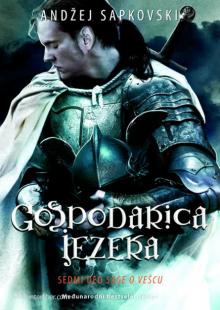 Gospodarica Jezera
Gospodarica Jezera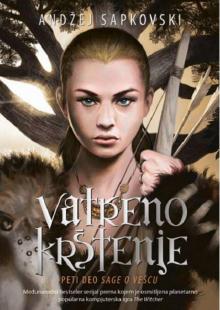 Vatreno Krštenje
Vatreno Krštenje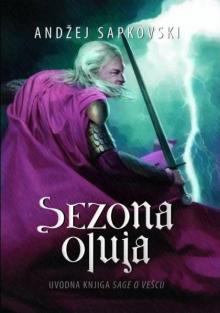 Sezona Oluja
Sezona Oluja Lady of the Lake
Lady of the Lake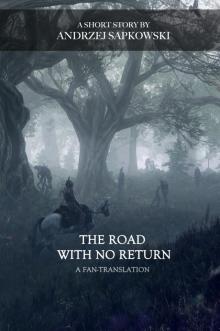 The Road With No Return
The Road With No Return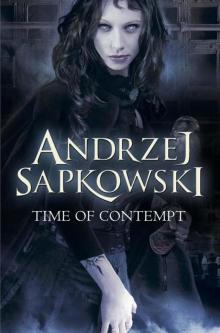 Time of Contempt
Time of Contempt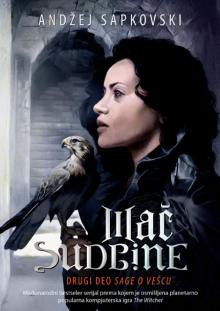 Mač Sudbine
Mač Sudbine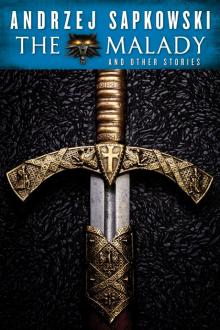 The Malady and Other Stories: An Andrzej Sapkowski Sampler
The Malady and Other Stories: An Andrzej Sapkowski Sampler The Saga of the Witcher
The Saga of the Witcher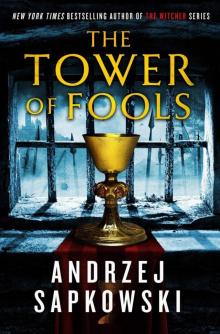 The Tower of Fools
The Tower of Fools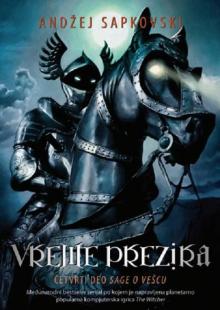 Vreme Prezira
Vreme Prezira Introducing the Witcher
Introducing the Witcher Stephen Hulin
Stephen Hulin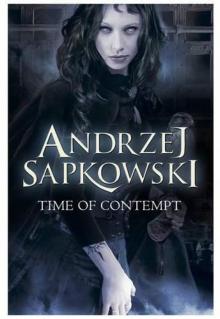 The Time of Contempt
The Time of Contempt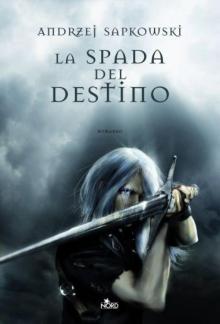 The Sword of Destiny
The Sword of Destiny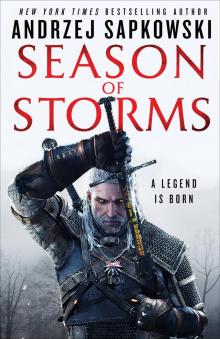 Season of Storms
Season of Storms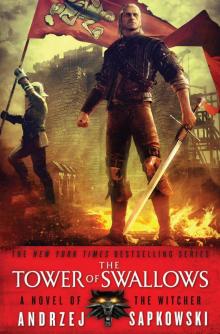 The Tower of Swallows
The Tower of Swallows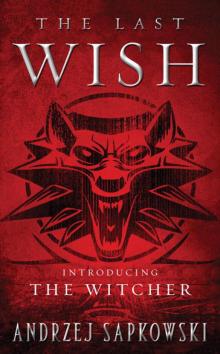 The Last Wish: Introducing The Witcher
The Last Wish: Introducing The Witcher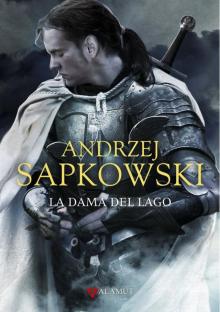 The Lady of the Lake
The Lady of the Lake